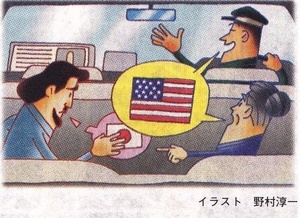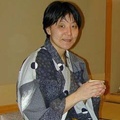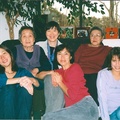I like to say that I have a transnational, multicultural, multiethnic identity. I am hapa, haafu, I am both/and, Japanese AND American. But I know that many others still see the world in dichotomies, as either/or, Japanese OR American.
I know what I look like. I’ve seen my face in the mirror before. But I forget that others might see me differently than I see myself. And I know who I am. But I am aware that others usually do not know me.
I was reminded of this while riding in a taxi with my 108 year-old grandmother in Matsuyama, a city on the island of Shikoku. Incredibly, she still likes shopping and chatted excitedly as we drove downtown to Mitsukoshi, her favorite department store. The taxi driver eyed me for a while in the rear view mirror before asking the inevitable question, “Where are you from?” I tried to dampen his curiosity. “Tokyo,” I answered curtly. But he was not easily discouraged, “I mean which country?” “Country?” I repeated, as if it was a dumb question. “I think Tokyo is in Japan, isn’t it?”
He looked at me strangely before laughing nervously. He was puzzled. He expected me to say America. Of course I could say America. My father was American and I lived there half my life. But I could also say Japan. I was born here, my mother, wife and children are Japanese and I have lived the other half of my life here. Then again, I could also say that I am multicultural, multilingual, multinational, transnational, international or a global citizen, not just a citizen of any one country.
My grandmother sitting beside me interrupted my musings by declaring to the taxi driver, “He’s an American, from the United States.”
I was about to protest, “Yes, but I am also Japanese,” but knew that it was futile; after all these years living in Japan, working for a national university, even legally becoming a Japanese citizen, she still thinks of me as her beloved American grandson.
“He grew up in America. That’s why his Japanese is a little funny,” she explained.
“Oh, so that’s why; he’s American! I thought he sounded a little strange,” the taxi driver said. “Japanese is really a hard language, isn’t it?”
It can’t be that hard if you learned it, I was tempted to say, but just kept quiet. After all, I am often told that I look different and sometimes am told that I talk a little differently. And if you look different and talk differently then you are likely to be seen as a foreigner in Japan, regardless of any other qualities you possess.
But to me, all the people who are citizens of Japan are Japanese. It doesn’t matter how they look or how they talk. I even think that some of those who are not legally citizens but have lived here a long time or their whole lives might be regarded as Japanese. In my view, including more people as Japanese will benefit society and is the way of the future.
I am often reminded that not everyone thinks the way I do. To my grandmother and the taxi driver, a person is either Japanese or American, one or the other, but not both. For them, Japanese is defined narrowly and does not include those who look different, talk differently, or think and act differently.
Later that night after I had left my grandmother at her home I got into another taxi. The driver eyed me in the rear view mirror before asking, “Where are you from?”
There are times that I feel it is my responsibility to educate others about the reality of multiple identities, hidden identities, stereotypes and racial profiling and so on, but it was late and I was tired so I just answered, “America.”
*This article was originally published in his blog, on February 18, 2012.
© 2012 Stephen Murphy-Shigematsu






